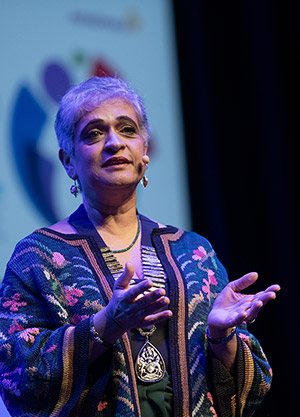

A welcome (but windy) return to Glasgow
At the height of the COVID-19 pandemic, a pressing need to reduce the rates of hospitalisation led to the initiation of two national clinical trials in primary care. The PRINCIPLE and PANORAMIC trials sought to identify existing and novel medicines to diminish the worst effects of the disease, limit hospitalisations and the strain on the NHS.
These primary care platform trials would take an innovative approach to recruitment. This included contributions from people and communities who have been previously underrepresented in clinical trials, who were seeing worse health outcomes from COVID-19 compared to the majority population.
From the get-go, the trials would see a high rate of engagement, firstly with the Principle trial, and later with the PANORAMIC trial which became the world’s largest and fastest recruiting randomised clinical trial in primary care - with over 25,000 participants in just over four months.
Crucially, those enrolled in the trial came from a wide variety of backgrounds. This included people from minority ethnic groups who had been inspired to help through an innovative outreach programme. This outreach work involved community leaders, social media influencers, community activists, national pharmacy, medical, and nursing organisations and more.

Professor Mahendra Patel OBE, a leading pharmacist academic and researcher, and the inclusion and diversity lead for the trials, worked closely with religious leaders. The BAPS Neasden Hindu Temple in North West London, the largest in Europe, the Muslim Council of Britain, and others helped raise the visibility of the trials within their communities. By engaging with communities as part of their religious and cultural practices, this approach was highly effective in establishing trust and connection.
A number of GP practices UK-wide were actively involved in recruiting participants to the trials and others promoted the trials with word-of-mouth and promotional posters in their surgeries.
Many pharmacies used their platforms to further spread the word in the community. At one point there were over 8500 pharmacies across the UK promoting the Principle trial through leaflets and posters in store and through their websites. The wider pharmacy network within primary and secondary care also became an added resource to help people become aware of the trials.
The findings of both the trials would go on to be presented at a national and international level, receiving acclaim in journals such as the Lancet for addressing historical ethnic and social inequalities in healthcare.
Following the successes of the trials for their inclusive outreach work, the Centre for Research Equity (CfRE) was formed. The organisation, led by Professor Patel as its Chief Executive, is funded by the NIHR Applied Research Collaboration Oxford and Thames Valley.
The Centre aims to take the lessons from the trials and help improve more representative research participation for people from diverse backgrounds. Its mission is to feature communities who may have historically been isolated from mainstream healthcare, due to language barriers, cultural differences, or other factors. This ensures that the latest developing trials consider appropriate ethnic and socioeconomic data more meaningfully and create inclusive treatments.
Professor Patel said: "When we began the PRINCIPLE and the PANORAMIC trial thereafter, we knew the huge challenge ahead of us in being truly democratic and as representative as possible if our recruitment strategy was to be successful at scale. There have been huge historical shortcomings in this area, and we were committed to addressing these and ensuring that our clinical research accurately reflected the socioeconomic makeup of Britain.
"Our work with students, religious leaders, influencers, TV and cultural media outlets helped us to not only growing the number of participants to huge numbers, but also reach communities that in many cases have never been approached to take part in clinical trials.
"We're now building on the successes of these trials with a permanent development programme at the CfRE, with the aim of furthering academic and industry recognition for the value of proper representation in clinical research."
The Centre, in conjunction with Birmingham University, has been successful in the NIHR’s recent call for funding for its Race Equity and Diversity in Careers Incubator. It will build research capacity and career development for health and care professionals from minority ethnic backgrounds. The Centre aims to expand with involvement from regulators, industry and other UK organisations to develop workshops and resources to highlight the importance of inclusion in medical research. It is looking to involve all four devolved nations in creating a hub and spoke model to showcase and support equitable research UK-wide.
Professor Patel went on to say: "The next steps for us at the CfRE are to carry forward the momentum of the trials. All branches of medicine and healthcare have a role to play - we would encourage everyone in primary care to discover how they can help ensure medical research is truly inclusive."
Read more

Thank you for your feedback. Your response will help improve this page.


